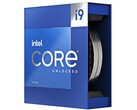Intel is all set to launch its Raptor Lake CPUs on September 27 during its Innovation event. Given that we are just a few weeks away from launch, more and more leaks pertaining to the 13th gen processors have started to surface online. Now, we have information that Intel will be lifting Raptor Lake's sales embargo on October 20. Also, we get to see that Intel can now finally catch up to AMD's Vega integrated graphics performance.
Raptor Lake's iGPU finally catches up to Vega 10
A Geekbench OpenCL score for the Core i9-13900 is now available that indicates that Intel will be boosting the iGPU clocks in the 13th gen, at least in the high-end SKUs. According to the benchmark entry, this Raptor Lake part's iGPU runs at a 1,650 MHz clock, which is 100 MHz faster than the Core i9-12900K's UHD Graphics 770 iGPU at 1,550 MHz. Raptor Lake parts have the same 32 execution units (EUs) architecture as Alder Lake, so we're only looking at a 6.45% increase in clocks at the moment.
This 100 MHz gain in clocks seems to have brought the UHD iGPU on par with an AMD Radeon RX Vega 10 iGPU with a score of 9,498 points. The Vega 10 was part of the 2017 lineup of Raven Ridge APUs such as the Ryzen 7 2700U. AMD's iGPU scores about 9,635 points in the same test.
It may be worth recollecting that AMD has moved on to using RDNA 2 parts for its APUs. The Radeon 680M in the Ryzen 6000 Rembrandt APUs is one of the fastest iGPUs in any mainstream processor with performance better than a dedicated Nvidia GeForce MX450. The Ryzen 7000 desktop parts also feature an integrated RDNA 2 iGPU albeit with just 2 compute units.
Intel has a lot of catching up to do in the iGPU space compared to AMD, but the future Meteor Lake generation might level the playing field. Meteor Lake is touted to sport a tiled iGPU or tGPU with possible ray tracing support at a level similar to Alchemist and Ponte Vecchio GPUs. However, we hear that Meteor Lake's tGPU might be handicapped in aspects such as XeSS support.
Raptor Lake lineup leak confirms flagship Core i9-13900K all-P-core turbo at 5.5 GHz
In related news, Intel is expected to lift the sales embargo on Raptor Lake SKUs on October 20. A total of 14 Raptor Lake parts are being lined up for the launch.
The primary lineup is comprised of the Core i5-13400, Core i7-13700, Core i9-13900 non-K parts, and the Core i5-13600K, Core i7-13700K, and the Core i9-13900K parts that can be overclocked. Intel is now allowing overclocking the iGPU frequencies as well for the K-series.
All these CPUs feature an 'A780h' iGPU with 32 EUs (similar to the one detailed above) while the Core i5-13400 is equipped with an 'A782h' iGPU with 24 EUs and a 1,550 MHz clock.
According to the leaked info, the Core i9-13900K is a 24C/32T processor with a base clock of 3 GHz and a single-core Thermal Velocity Boost (TVB) of 5.8 GHz on the P-core. The all-P-core boost value is 5.5 GHz, while the E-cores can boost up to 4.3 GHz. Memory support includes DDR4-3200 and DDR5-5600 for all processors, save for the Core i5-13400 that supports only up to DDR5-4800. However, overclocking the memory controller should overcome this limitation.
We had first reported about the entire Raptor Lake stack back in August 2021, and the present data seems to tally well with the earlier leak. There is no mention of Core i3, Pentium, and Celeron parts in the current info.
The base TDP for the K parts is specified as 125 W while the non-K CPUs are rated at 65 W. Most Intel motherboards do not impose any hard caps on the PL2 value, so expect higher running TDPs.
Following the K and non-K CPUs are the KF, F, and T lineups. The KF and F do not feature an iGPU, but most other specifications are similar. The T parts, on the other hand, feature the A780h iGPU but are capped at a 35 W TDP, which limits their base and boost clocks to more conservative values.
These specifications, if actual, do seem quite impressive. Intel is expected to outdo AMD's Zen 4 performance with Raptor Lake. With the company also speculated to go for an aggressive pricing strategy this time around, factors such as performance and power efficiency could be the primary deciding factors in choosing a platform.
In any case, this year's offerings from both Team Red and Team Blue seem to present great upgrade opportunities.
Source(s)
Geekbench via @BenchLeaks





































